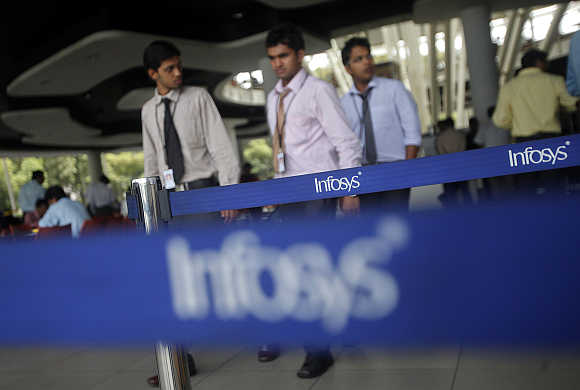 | « Back to article | Print this article |
Indian infotech sector is becoming a riskier bet
The potential implementation of the US immigration Bill has added to the challenges faced by Indian information technology (IT) companies.
For the sector, under pressure from rising uncertainty in clients' budgets, deal fragmentation and slowing discretionary spending, this is more bad news.
Profit margins for most large-cap IT companies are also headed south on increasing competition and expensive deal acquisitions.
Click NEXT to read more...
Indian infotech sector is becoming a riskier bet
Indian IT players have largely focused on application development and maintenance work, which are predictable and provide a stable margin.
But the penetration of this business is high, and now IT companies will have to chase growth through the consulting business, which will add volatility.
Not surprisingly, the beta of large Indian IT stocks such as Tata Consultancy Services (TCS), Infosys Ltd, Wipro and HCL Technologies has increased from 0.5-0.7 in 2004-08 to about 0.7-0.9 in the past three years.
Click NEXT to read more...
Indian infotech sector is becoming a riskier bet
Analysts expect this beta to increase. A beta of one means the stock carries the same risk as the broad index; below one means lower risk, while above one makes it riskier than the market.
"As industry cycles get shorter, the cyclicality of Indian IT companies rises, and as Indian IT increasingly competes with and mirrors Accenture, they could tend to approach Accenture in their business rhythm. Accenture's beta of 1.1 has always been higher due to its higher cyclicality, thanks to its consulting exposure. This difference is narrowing over time as Indian IT's beta rises," says Viju K George, IT analyst, JP Morgan.
Click NEXT to read more...
Indian infotech sector is becoming a riskier bet
A higher beta pulls down a company's valuation ratios such as the price-earnings (PE) multiple and EV/Ebitda ratios.
Analysts estimate a rise in beta of 0.2-0.3 could adversely impact valuation ratios by up to 20 per cent.
This means IT stocks could be in for a structural de-rating of their valuation multiples. The PE multiple of large IT companies has already slid from 19-43 times in FY09 to 13-20 times now.
Click NEXT to read more...
Indian infotech sector is becoming a riskier bet
The impact of the Bill, yet to be passed, will vary on the strategies adopted by each company.
Companies can increase local hiring, move H-1B employees offshore and increase the number of delivery centres in the US, though all these measures will dilute profitability.
Abhiram Eleswarapu, IT analyst, BNP Paribas Securities, says, "If the US immigration Bill goes through in its present form, the revenue impact on our covered companies from the outplacement provision (moving H1B employees from US to other location) is 8-26 per cent in the worst case. If we ignore the outplacement provision, we calculate a potential margin impact from other proposals at 100-400 basis points on our FY15 Ebit margin projections."





